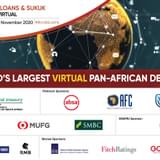According to Reuters, of South Africa’s total debt, which stands at SAR2.2tn (US$153.10bn), 90% is denominated in rand, which amounts to about SAR1.7tn (US$118bn).
South Africa’s local currency-denominated debt has this month been downgraded by Fitch to BBB-, one notch above junk status. The ratings agency joined S&P Global Ratings in its assessment of the country’s rand-denominated debt.
The three main ratings agencies will again review South Africa in December, when the country’s credit rating is likely to face a downgrade.
“We are pricing for a long-term foreign currency rating downgrade by one of the three major ratings agencies in our valuation models,” said Rhandzo Mukansi, quantitative analyst at Futuregrowth Asset Management.
He added that although June’s reprieve from junk status demonstrates that a near-term downgrade is anything but a foregone conclusion, there is not yet much evidence the South African government is taking the necessary reform measures to price out the probability of one.
To avoid a downgrade, the country needs to address areas of the economy in need of reform, particularly the labour market, rectifying SOE governance and rebuilding investor and business confidence in the local economy.
Due to the fact that foreign investors hold about 35% of South Africa’s outstanding local currency debt, there could be a significant impact on the performance of the country’s domestic debt in the event of automatic selloffs prompted by a downgrade.
However, because of index inclusion rules, foreign investors are unlikely to become forced sellers in the event of a downgrade to junk.
The ratings inclusion criteria for the major global indices with such criteria (Citi Bank’s World Government Bond Index and Barclays’s Global Aggregate Index) state that South Africa’s long-term local currency rating can be sub-investment from either S&P Global Ratings and Moody’s in the case of the former, and sub-investment from S&P Global Ratings, Moody’s and Fitch in the case of the latter.
“Furthermore, the inclusion criteria of other major global bond indices that South Africa is included in, such as JP Morgan’s Global Diversified Index, are ambivalent to credit ratings.”
Mukansi said that although there was a real risk to South Africa’s long-term foreign currency rating, there is still likely to be a high hurdle for foreign bond market participants in becoming forced sellers of the country’s local currency debt.









